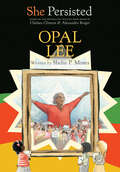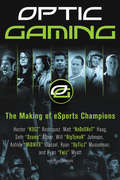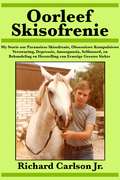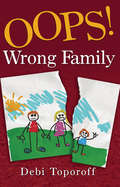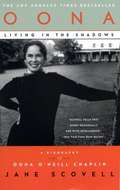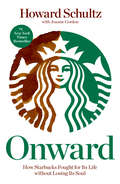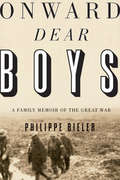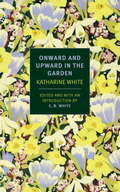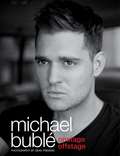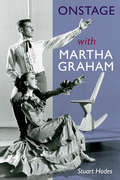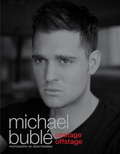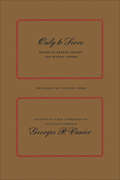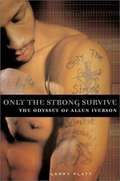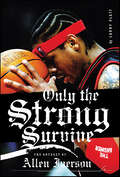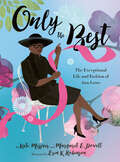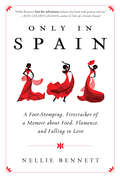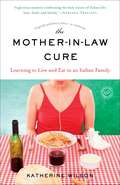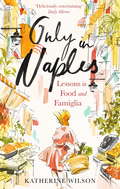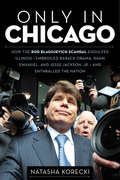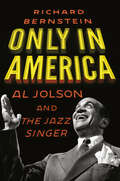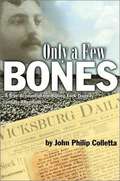- Table View
- List View
Opal Lee (She Persisted)
by Shelia P. Moses Chelsea ClintonInspired by the #1 New York Times bestseller She Persisted by Chelsea Clinton and Alexandra Boiger, a chapter book series about women who spoke up and rose up against the odds—including Opal Lee! <p><p> Opal Lee grew up as a Black girl in Texas at a time when Black and white people were kept separate and Black people had fewer opportunities than white people did. She knew that this wasn’t right, and she grew up to be a teacher and a community leader, determined to help create a better future for all people. A big part of her work and life was making Juneteenth a national holiday to mark the end of enslavement for Black Americans. She loved this day as both a celebration and as a way of teaching about the past. Opal’s work and dedication has helped millions of people learn about important parts of American history. <p><p> In this chapter book biography by critically acclaimed author Shelia P. Moses, readers learn about the amazing life of Opal Lee—and how she persisted. <p><p> Complete with an introduction from Chelsea Clinton, black-and-white illustrations throughout, and a list of ways that readers can follow in Opal Lee’s footsteps and make a difference! A perfect choice for kids who love learning and teachers who want to bring inspiring women into their curriculum.
OpTic Gaming: The Making of eSports Champions
by Fwiz H3cz Midnite Scump Optic J Bigtymer NadeshotOpTic Gaming, the four-time Call of Duty Major League Gaming Champions and one of the top eSports teams in the world, now takes fans behind the controller--into the game and the minds of the greatest gamers in the world--in this fascinating and unique memoir and insider guide.Emerging on the scene in 2006, OpTic Gaming has dominated the Call of Duty e-sports arena, thanks to the talents of legendary players such as Matt "NaDeSHoT" Haag, the biggest eSports personality on earth; Seth "Scump" Abner, the best Call of Duty player in the world; Midnite, one of the first girl gamers to rise to stardom on YouTube; and Hector "H3CZ" Rodriguez, the team founder and CEO. With over 14 million followers across social platforms like Twitter, Facebook and YouTube, no other team of players in eSports can match OpTic's popularity or ability to bring fans into the game.Now, these remarkable players have collaborated to produce this one-of-a-kind book. In OpTic Gaming, they candidly share their story of becoming Call of Duty's global royalty--ESPN XGAMES, MLG, ESWC and GFINITY champions--laying bare their lives, exploring what it takes to make it in professional gaming, and speaking honestly about the consequences of their newfound fame. These best-of-the-best take you behind the controller, offering insights, knowledge, and strategies to help you improve your shot, master the most complex maps, and conquer the game with the ultimate weapons. Going beyond their number-one game, the team also discusses the rest of their lineups and how to become a champion in any arena. Revealing their go-to strategies, best missions, and favorite challenges, OpTic Gaming brings fans closer to these wildly popular professional gamers more than ever before.
Ooru Keri
by Siddlingaiah S. R. RamakrishnaDr. Siddalingalah is one of India's foremost dalit writers. Born in Magadi in southern Karnatka, he studied in village schools before he went to Bangalore to acquire his MA and PhD degrees.
Oorleef Skisofrenie
by Richard Carlson Jr.Richard Carlson Jr. was gediagnoseer met paranoïese skisofrenie toe hy een – en – twintig jaar oud was. Sy siekte het begin toe hy in vroeë adolessensie was. Moderne psigiatrie het Richard oor ‘n dekade misluk. Toe, na ‘n insident met die polisie het hy regtig verstaan dat sy diagnose werklik is, en het uiteindelik die lang proses om te herstel begin. Meer as tien jaar later het sy lewe geweldig verbeter. Saam met sy behandeling het Richard ook herstel van depressie, obsessiewe – kompulsiewe – versteuring, en lusteloosheid. Moenie dat dit wat met Richard gebeur het, met jou, ‘n geliefde, of ‘n pasiënt met ernstige geestes siektes gebeur nie. Wees altyd eerlik met mekaar, en met jou psigiater.
Oops! Wrong Family
by Debi ToporoffThe personal story of author Debi Toporoff will help those dealing with the memory and pain of abuse, as well as those looking to understand what children suffering from abuse have experienced.Toporoff uniquely tells her story from a child's perspective, highlighting her mother's physical abuse, her father's neglect, and the moments of rest she had while taken away to foster families.By the age of four, Toporoff remembers being held responsible for cleaning the household while enduring the wrath of her never-satisfied mother. Not for the faint of heart, she graphically tells of going blind in one eye, cracking her skull, and breaking her leg, all by her mother's hand.Through several foster families, caring teachers and co-workers, Toporoff pieced together the story of Jesus, and his forgiveness and never-failing love for her, which lead to hope and forgiveness.
Oona Living in the Shadows: A Biography of Oona O'Neill Chaplin
by Jane ScovellA biography of the life of the enigmatic daughter of Eugene O'Neill & wife of Charlie Chaplin, encompassing her intriguing family members & circle of friends.
Onward: How Starbucks Fought for Its Life without Losing Its Soul
by Howard SchultzSchultz's story of how he transformed a failing company back to sustained, profitable growth. He offers readers an extraordinarily intimate look at his daily decision-making process, from closed-door planning sessions in Seattle, to conversations with coffee farmers in Rwanda, to investor presentations in New York during the worst of the economic turmoil.
Onward: How Starbucks Fought for Its Life without Losing Its Soul
by Howard Schultz Joanne GordonIn this #1 New York Times bestseller, the CEO of Starbucks recounts the story and leadership lessons behind the global coffee company's comeback and continued success.In 2008, Howard Schultz decided to return as the CEO of Starbucks to help restore its financial health and bring the company back to its core values. In Onward, he shares this remarkable story, revealing how, during one of the most tumultuous economic periods in American history, Starbucks again achieved profitability and sustainability without sacrificing humanity. Offering you a snapshot of the recession that left no company unscathed, the book shows in riveting detail how one company struggled and recreated itself in the midst of it all. In addition, you’ll get an inside look into Schultz's central leadership philosophy: It's not about winning, it’s about the right way to win. Onward is a compelling, candid narrative documenting the maturing of a brand as well as a businessman. Ultimately, Schultz gives you a sense of hope that, no matter how tough times get, the future can be more successful than the past.
Onward, Dear Boys: A Family Memoir of the Great War
by Philippe BielerThe Bieler family's vast collection of wartime letters and photographs tell intimate, firsthand stories of five young brothers and their parents. In Onward, Dear Boys, Philippe Bieler skilfully weaves together his own voice with those of his grandparents, his father, and his uncles into a story of war, immigration, and family life. Settling in the province of Quebec, then divided into French-speaking Catholics and English-speaking Anglicans, was a struggle for these devout, francophone Calvinists, but with the unexpected declaration of war in 1914 came an even greater challenge. In 1915 three of the five Bieler boys volunteered with the Princess Patricia Regiment, and in 1916 the fourth son followed. The eldest, Jean, became an assistant to Colonel Birkett, commander of the McGill-financed Canadian Hospital in Boulogne, and the second-eldest, Etienne, was promoted to lieutenant of an artillery brigade. The other two were privates who fought in battles including Sanctuary Wood, the Somme, Vimy, and Passchendaele, and in 1917, the fourth son, Philippe, died at the front. Upon their return to civilian life, the surviving brothers became leaders in government, science, and the arts : the eldest as Deputy Finance Director of the League of Nations, the second as a colleague of Sir Ernest Rutherford in the research of the atom, and the third as President of the Federation of Canadian Artists. The youngest, Jacques, who was too young to go to war, was an instigator of the CCF party, a precursor to the NDP. Enlivened by a wealth of family archival material, Onward, Dear Boys is a poignant story of the experiences of war and its impact on a family of new Canadians during the first decades of the twentieth century.
Onward, Dear Boys
by Philippe BielerThe Bieler family's vast collection of wartime letters and photographs tell intimate, firsthand stories of five young brothers and their parents. In Onward, Dear Boys, Philippe Bieler skilfully weaves together his own voice with those of his grandparents, his father, and his uncles into a story of war, immigration, and family life. Settling in the province of Quebec, then divided into French-speaking Catholics and English-speaking Anglicans, was a struggle for these devout, francophone Calvinists, but with the unexpected declaration of war in 1914 came an even greater challenge. In 1915 three of the five Bieler boys volunteered with the Princess Patricia Regiment, and in 1916 the fourth son followed. The eldest, Jean, became an assistant to Colonel Birkett, commander of the McGill-financed Canadian Hospital in Boulogne, and the second-eldest, Etienne, was promoted to lieutenant of an artillery brigade. The other two were privates who fought in battles including Sanctuary Wood, the Somme, Vimy, and Passchendaele, and in 1917, the fourth son, Philippe, died at the front. Upon their return to civilian life, the surviving brothers became leaders in government, science, and the arts : the eldest as Deputy Finance Director of the League of Nations, the second as a colleague of Sir Ernest Rutherford in the research of the atom, and the third as President of the Federation of Canadian Artists The youngest, Jacques, who was too young to go to war, was an instigator of the CCF party, a precursor to the NDP. Enlivened by a wealth of family archival material, Onward, Dear Boys is a poignant story of the experiences of war and its impact on a family of new Canadians during the first decades of the twentieth century.
Onward and Upward in the Garden
by E. B. White Katherine S. WhiteIn 1925 Harold Ross hired Katharine Sergeant Angell as a manuscript reader for The New Yorker. Within months she became the magazine's first fiction editor, discovering and championing the work of Vladimir Nabokov, John Updike, James Thurber, Marianne Moore, and her husband-to-be, E. B. White, among others. After years of cultivating fiction, White set her sights on a new genre: garden writing. On March 1, 1958, The New Yorker ran a column entitled "Onward and Upward in the Garden," a critical review of garden catalogs, in which White extolled the writings of "seedmen and nurserymen," those unsung authors who produced her "favorite reading matter." Thirteen more columns followed, exploring the history and literature of gardens, flower arranging, herbalists, and developments in gardening. Two years after her death in 1977, E. B. White collected and published the series, with a fond introduction. The result is this sharp-eyed appreciation of the green world of growing things, of the aesthetic pleasures of gardens and garden writing, and of the dreams that gardens inspire.
Onstage, Offstage
by Michael BubléHe's sold more than 25 million records. His live shows fill the world's biggest stadiums to capacity. He has captured hearts everywhere with his classic style. Now, for the first time ever, Grammy Award-winning singer Michael Bublé offers fans an all-access, behind-the-scenes glimpse at his private life, onstage and off.Pairing the singer's own heartfelt words with hundreds of exclusive, never-before-seen photographs, this unique diary reveals Bublé's inspirational journey, from singing into a hairbrush in his suburban Canadian bedroom to entertaining thousands onstage at New York's famed Madison Square Garden. The humble man, the eager-to-learn young musician, the hardworking profes-sional, the adoring husband, the fun-loving guy--the singer's many faces are here in stunning, intimate detail. Fans will experience what it's like to be on tour and in the studio with Bublé as he unveils the private person beneath the public persona. That rare, down-to-earth star whose unforgettable voice resonates with people from all walks of life, Michael Bublé is a natural talent. And for the fan in your life, this beautiful keepsake is both a reminder of the power of dreams and an up-close-and-personal peek at one of the greatest entertainers of our time.
Onstage, Offstage
by Michael BubléHe's sold more than 25 million records. His live shows fill the world's biggest stadiums to capacity. He has captured hearts everywhere with his classic style. Now, for the first time ever, Grammy Award-winning singer Michael Bublé offers fans an all-access, behind-the-scenes glimpse at his private life, onstage and off.Pairing the singer's own heartfelt words with hundreds of exclusive, never-before-seen photographs, this unique diary reveals Bublé's inspirational journey, from singing into a hairbrush in his suburban Canadian bedroom to entertaining thousands onstage at New York's famed Madison Square Garden. The humble man, the eager-to-learn young musician, the hardworking profes-sional, the adoring husband, the fun-loving guy--the singer's many faces are here in stunning, intimate detail. Fans will experience what it's like to be on tour and in the studio with Bublé as he unveils the private person beneath the public persona. That rare, down-to-earth star whose unforgettable voice resonates with people from all walks of life, Michael Bublé is a natural talent. And for the fan in your life, this beautiful keepsake is both a reminder of the power of dreams and an up-close-and-personal peek at one of the greatest entertainers of our time.
Onstage with Martha Graham
by Stuart HodesWhen World War II was over, a young bomber pilot with an itch for movement and action hung up his cap and learned another way to fly. Onstage with Martha Graham is the story of Stuart Hodes, a versatile and influential dancer who got his start with Martha Graham, an icon of modern dance. His memoir is a rare firsthand view of the dance world in the 1940s and through the end of the twentieth century. One of the few male dancers in Graham’s company—and in the New York dance scene at the time—Hodes offers a unique perspective and a one-of-a-kind narrative. He describes how he fell into the art by chance, happening to walk into Graham’s studio one day. He was soon hooked. He documents his experiences, travels, passions, and loves while learning from and performing with Graham, during which time he saw most of the United States, much of Europe, and some of Asia. Advancing quickly, he eventually danced as Graham’s partner in Appalachian Spring, Deaths and Entrances, Every Soul Is a Circus, and Errand into the Maze. In his portrait of Martha Graham, who was the center of his dancing world, Hodes recounts conversations, revelations, bouts of temper and creativity, the daily ritual of deeply physical dancing, and the never-ending search for artistic validity. Direct, often humorous, and always authentic, Hodes shares his delight in dance as both hard work and a fantastic adventure.
Onstage Offstage: The Official Illustrated Memoir
by Michael BubleAn intimate portait, in pictures and his own words, of the enormously successful Canadian singer Michael Bublé became an international phenomenon with the release of his first, self-titled album of 2003, which reached the top ten in Canada and in the UK. Since then he has sold more than 25 million albums, and filled concert halls and stadiums worldwide.OnStage OffStage is an intimate portrait of this extraordinary singer, told in his own words and through the photographs of Dean Freeman. Bublé talks about his BC upbringing, his early nightclub days, the excitements and temptations of fame, and the sometimes gruelling demands of the road. Buble is a man who takes his music seriously, and himself less so, telling his story with refreshing candour and frequent flashes of self-deprecating humour. You might be tempted to use the expression "warts and all" -- except that the stunning photos in this book clearly show he doesn't have any. But they do capture Bublé in his every mood and in every setting, at home and at leisure, in rehearsal, in the heat of peformance. OnStage OffStage adds up to the second closest encounter any fan could wish for.
Only to Serve: Selections from Addresses of Governor-General Georges P. Vanier
by George Cowley Georges Vanier Michel VanierCollected in this volume are selections from addresses by His Excellency, General Georges P. Vanier, one of the most eminent public figures of Canada. His broad interests and deep involvement in all aspects of Canadian life are reflected in these speeches. A life-long concern with the importance of the family is evident in his opening talk at the Canadian Conference on the Family in 1964: "...the best and surest way of developing generous and idealistic hearts, of giving the community men and women who are well-balanced and conscious of their responsibilities to their country, is to protect the family, for the family...is capable of giving to the universe the human beings who are prepared to put justice and truth before their own personal interests." From this conference emerged the Vanier Institute of the Family.Closely allied to the Governor-General's dedication to the family was his interest in the youth of the country. During his time of office he strove continually to bring Canadians to a fuller realization of the importance of their young people: "Tell me the character of a nation's young people and I will tell you the future of the nation."The book also includes the core of the Governor General's statements on education, reflections that have special meaning for every teacher and educator in Canada. His views on public life and on the democratic ideal, and his great desire for better understanding between English and French Canadians and for the essential unity of the Canadian nation, also hold a place of prominence in these excerpts.The final section of the book is devoted to his intense concern for the spiritual side of man's existence, for the ideals and values that set man apart and allow him to hope for a better world.Dr Wilder Penfield, head of the Vanier Institute of the Family, who was a close friend of the Governor General, and Claude Ryan, editor of Le Devoir, have written forewords for the volume.
Only the Strong Survive: The Odyssey of Allen Iverson
by Larry PlattFilled with exclusive interview material granted through unprecedented access to Allen Iverson, the iconic basketball superstar himself, "Only the Strong Survive" provides an in-depth look at the truth behind this newly minted legend.
Only the Strong Survive: The Odyssey of Allen Iverson
by Larry PlattPart sports star, part antihero, part hip-hop icon, Allen Iverson has managed to cross over into the mainstream of American culture -- without compromise. Defiantly tattooed, with his hair in cornrows, the six-foot Philadelphia 76ers point guard is one of the most recognizable and controversial stars of the sports world. His meteoric rise from a troubled childhood in the ghetto to NBA superstardom has been marked by five straight playoff appearances, including a finals berth in 2001 and an MVP award. From his rap sheet to his rap album, fans and journalists alike hound his every move. But never before has a biographer presented a full portrait of this complicated and intensely private star -- a man whose loyalty to his family, the streets, and his friends trumps any other concern. Filled with exclusive interview material and unprecedented access to many of Iverson's inner circle, Only the Strong Survive is the first in-depth look at the truth behind this newly minted legend.
Only the Best: The Exceptional Life and Fashion of Ann Lowe
by Kate Messner Margaret E. PowellAn inspiring picture book biography of the amazing Anne Lowe, the first nationally-known African American fashion designer! A careful snip, a delicate fold.Fabric the color of new petals.Skirts that flare like upside-down blossoms.A garden bursts into bloom! There is no "good enough."For Ann, only the best will do. Award-winning author Kate Messner, costume historian Margaret E. Powell, and fashion designer and illustrator Erin Robinson tell the powerful story of the ground-breaking Ann Lowe, who grew up in a small Alabama dress shop and became the first nationally-known African American fashion designer. Sought after by millionaires and movie stars, her designs walked the red carpet and graced the wedding of Senator John F. Kennedy and Jacqueline Bouvier. At a time when the world around her thought African Americans deserved no more than second-class treatment, Ann expects no less of herself, and no less FOR herself, than the BEST. THE FIRST, FAMED BLACK FASHION DESIGNER: Although she faced many hardships, Anne's spirit, talent, and belief in herself always shone through. This story provides an empowering, real-life role model for young girls—and especially Black girls—to relate to and see themselves in, at an age when building self-confidence is more important than ever! ENCOURAGES CREATIVITY AND PERSERVERENCE: Full of interesting details about how Anne came up with her designs, and how she always forged ahead in spite of setbacks, this true story will captivate aspiring artists and young creative thinkers alike. SURE OF HER OWN WORTH: This book makes a perfect gift for anyone looking to celebrate, empower, and inspire the women in their lives—whether daughters, granddaughters, nieces, cousins, or friends. Ann Lowe stands as a testament to the power of knowing we're both capable of and deserve ONLY THE BEST. BEAUTIFUL, IMMERSIVE PROSE: Wonderful, vivacious writing by award-winning author Kate Messner and expert historian Margaret E. Powell brings Anne's pride in herself and her work to life in rich detail! Perfect for:Parents, grandparents, and caregiversTeachers and librariansReaders who loved Little Leaders and Parker Looks UpThe vast #WeNeedDiverseBooks communityAnyone seeking books about Black excellence, female empowerment, or Black historyGift-givers looking for a beautiful, inspirational book for the girls (or women) in their lives
Only in Spain
by Nellie BennettWhy don't' you...run away with the gypsies?Ten-hour shifts in a high-end department store and catering to snooty customers...Nellie Bennett's life wasn't supposed to turn out this way. But maybe all she needs to do is infuse a little passion into her routine--through flamenco dance lessons, for instance.What Nellie doesn't realize is that flamenco is not just a dance--it's a way of life that seems much more enticing than her depressing retail gig. So she packs her suede dance shoes and leaves everything she knows behind, flying halfway around the world to seek the authentic experience in Seville, where the dark-eyed gypsy boys and mouth-watering tapas are enough to make Nellie want to stay in Spain forever. And why shouldn't she?Only in Spain is a foot-stomping, full-on firecracker of a memoir--crackling with energy, food, dance, gypsies, and love--that will capture your heart with the first "Olé!""A vivid, entertaining memoir...Bennett had me itching to pack my bag and join her."--Ann Vanderhoof, author of An Embarrassment of Mangoes and The Spice Necklace
Only in Naples: Lessons in Food and Famiglia from My Italian Mother-in-Law
by Katherine WilsonFull of lighthearted humor, sumptuous food, the wisdom of an Italian mother-in-law, and all the atmosphere of Elena Ferrante's Neapolitan Novels, this warm and witty memoir follows American-born Katherine Wilson on her adventures abroad. Thanks to a surprising romance--and a spirited woman who teaches her to laugh, to seize joy, and to love--a three-month rite of passage in Naples turns into a permanent embrace of this boisterous city on the Mediterranean.When I saw the sea at Gaeta, I knew that Naples was near and I was coming home."There is a chaotic, vibrant energy about Naples that forces you to let go and give in," writes Katherine, who arrives in the city to intern at the United States Consulate. One evening, she meets handsome, studious Salvatore and finds herself immediately enveloped by his elegant mother, Raffaella, and the rest of the Avallone family. From that moment, Katherine's education begins: Never eat the crust of a pizza first, always stand up and fight for yourself and your loved ones, and consider mealtimes sacred--food must be prepared fresh and consumed in compagnia. Immersed in Neapolitan culture, traditions, and cuisine, slowly and unexpectedly falling for Salvatore, and longing for Raffaella's company and guidance, Katherine discovers how to prepare meals that sing, from hearty, thick ragù to comforting rigatoni alla Genovese to pasta al forno, a casserole chock-full of bacon, béchamel, and no fewer than four kinds of cheeses. The secret to succulent, tender octopus? Beat it with a hammer. While Katherine is used to large American kitchens with islands and barstools, she understands the beauty of small, tight Italian ones, where it's easy to offer a taste from a wooden spoon. Through courtship, culture clashes, Sunday services, marriage, and motherhood (in Naples, a pregnancy craving must always be satisfied!), Katherine comes to appreciate carnale, the quintessentially Neapolitan sense of comfort and confidence in one's own skin. Raffaella and her famiglia are also experts at sdrammatizzare, knowing how to suck the tragedy from something and spit it out with a great big smile. Part travel tale, part love letter, Only in Naples is a sumptuous story that is a feast for the senses. Goethe said, "See Naples and die." But Katherine Wilson saw Naples and started to live. Advance praise for Only in Naples "In a world filled with food memoirs, this one stands out. Katherine Wilson gives us more than the fabulous food of Naples. She offers us a passport to an exotic country we would never be able to enter on our own."--Ruth Reichl, author of My Kitchen Year"Wilson has written a glorious memoir celebrating the holy trinity of Italian life: love, food, and family. Her keen eye and sense of humor take you through the winding streets of Naples at a clip, on a ride you hope will never end."--Adriana Trigiani, author of The Shoemaker's Wife "How lucky we are to get these hilarious and wise perceptions filtered through a sincerely loving eye."--Julie Klam, author of Friendkeeping "This thoroughly enjoyable love letter to Naples is a tribute to the author's irrepressible mother-in-law."--Luisa Weiss, author of My Berlin Kitchen and founder of The Wednesday Chef "Wilson's easygoing writing perfectly suits this tale of an innocent abroad, an American girl who discovers herself in the midst of a foreign culture that becomes, in the end, her own."--Kate Christensen, author of How to Cook a MooseFrom the Hardcover edition.
Only in Naples: Lessons in Food and Famiglia from My Italian Mother-in-Law
by x Katherine WilsonA Radio 4 Book of the Week'See Naples and die', said Goethe. But Katherine Wilson saw Naples and started to live. Katherine is fresh out of college when she arrives in Naples to intern at the US Consulate. There she meets handsome, studious Salvatore, and finds herself enveloped by his family - in particular by his elegant mother, Raffaella, who begins her real education: never eat the crust of a pizza first, always stand up and fight for yourself and your loved ones, and remember that mealtimes are sacred. Immersed in Neapolitan culture, tradition and cooking, slowly and unexpectedly falling for Salvatore, and basking in Raffaella's company and guidance, Katherine discovers how to prepare meals that sing, from rich ragù to pasta al forno, with bacon, béchamel and four kinds of cheese. Through courtship, culture clashes, Sunday Mass, marriage and motherhood, Katherine slowly comes to appreciate carnale, the quintessentially Neapolitan sense of comfort and confidence in one's own skin. Steeped in sunlight, wine and unforgettable food, Only in Naples is a love letter to a city and a family, a coming-of-age story, and a transporting account of learning to live the Italian way. 'Katherine Wilson gives us more than the fabulous food of Naples. She offers us a passport to an exotic country we would never be able to enter on our own.' Ruth Reichl, author of My Kitchen Year
Only in Chicago
by Natasha Korecki"As the circus of the Blagojevich saga unfolded, Natasha Korecki was right at the center.... It was a seriocomedy suited to her enterprise and imagination, and she's the one to write the book." -Roger Ebert"Natasha Korecki's chronicle of the Blagojevich saga was a cutting-edge lesson in how to blend old-fashioned reporting with new media." -Richard RoeperChicago, Illinois, and America at large were captivated by the arrest, trial, and general public embarrassment of Illinois governor Rod Blagojevich. Only in Chicago is derived from the best of award-winning Chicago Sun-Times reporter Natasha Korecki's work on the Blagojevich scandal, weaving together years of reporting and never-before published details into one straightforward, fast-paced narrative. From the infamous audiotapes to Blagojevich's strange public relations campaign, this is one of the most bizarre true political tales ever told.Beyond the slew of backroom dealmakers who were sucked into the Blagojevich imbroglio, President Barack Obama himself--while never accused of any wrongdoing--was also interviewed by federal prosecutors. Now-mayor Rahm Emanuel's discussions with Blagojevich are included as well. The political figure who became most entangled with the scandal, however, was Congressman Jesse Jackson Jr., who is accused of offering Blagojevich $6 million for Obama's vacated Senate seat through an intermediary.
Only in America: Al Jolson and The Jazz Singer
by Richard BernsteinA probing biography of world-renowned Jewish singer and actor Al Jolson and the history of his performance in and the making of The Jazz SingerAl Jolson, born Asa Yoelson, immigrated from a shtetl in Lithuania to the United States in 1894 after his father secured a job as a rabbi in Washington, D.C. A poor, Yiddish-speaking newcomer navigating a racially segregated and antisemitic America, young Jolson dreamed of becoming a star, and he did. Thanks to his immense talent and his knack for assimilating into new environments, by the time he reached his twenties he was the most famous and highly paid entertainer in America, making almost $5,000 a week at a time when the average American made $800 a year. Jolson&’s public adoration and widespread acceptance as a star marked the beginning of an enriching cultural transformation, a moment when the American mind opened up to ethnic and racial differences, widening the gap of acceptability. And yet Jolson himself, despite being ferociously ambitious and gigantically talented, was crippled by insecurity, often nervous to the point of collapse, prisoner to his many vices.Through Jolson, Bernstein simultaneously breaks open the history and legacy of the cultural sensation The Jazz Singer. Not only was The Jazz Singer the first feature length film with synchronized music and dialogue, but it was also taboo smashing in its content: The Jazz Singer is all about Jews, Orthodox and otherwise. Bernstein expounds on the making of The Jazz Singer, what the film meant then and now, introducing the many individuals involved in its production, including Samson Raphaelson, a young Jewish writer whose short story was the basis for the movie; the four Warner brothers, who made a fortune off it; and George Jessel, Jolson&’s rival and the star of Raphaelson's stage adaptation of his short story. In the background emerges a picture of old Hollywood in the Roaring Twenties: cutthroat and greedy yet visionary and progressive. And while The Jazz Singer represented the future in many ways, it also dredged up the worst of the past, including Jolson&’s use of blackface, common at the time.At once a tale of the Judaizing of American culture and an acknowledgment of the challenges to come, Only in America is a glistening examination of a man at the center of a watershed moment in the arts.
Only a Few Bones: a True Account of the Rolling Fork Tragedy and its Aftermath
by John Philip CollettaAfter careful research, the author shares his family history.
